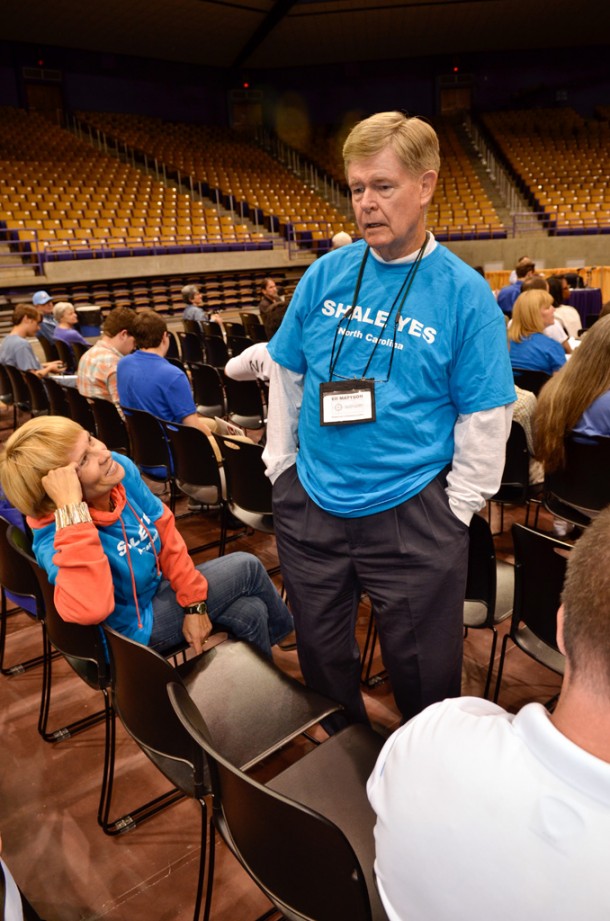Fracking Brings Few Jobs, Major Destruction, Mountain Residents Tell Nc Energy Commission
No fracking in North Carolina, a heavily partisan crowd told the state Mining and Energy Commission on Friday, Sept. 12.
Speaker after speaker at the Ramsey Center at Western Carolina University told a three-member commission panel that the proposed rules governing the exploration and production of natural gas through hydraulic fracturing, better known as fracking, were too industry-friendly and dangerous to the public.
Fracking, the process of extracting oil and gas from underground by using pressurized water and chemicals to create fissures in sub-surface rocks, has no place in the mountains or in North Carolina, the speakers told the panel and an audience of several hundred people.
“It’s cheaper to prevent contamination than to clean it up,” Franklin resident John Gladden, a retired research manager, told the commissioners.
Carolina Public Press first reported last November that state environmental officials planned to study whether fracking in the seven far-western counties was possible. Most, recently, however, officials said the state has postponed that preliminary study this fiscal year, The Sylva Herald reported.
MORE:
All reporting from Carolina Public Press on fracking in WNC
The four-hour public hearing was the final of four the Mining and Energy Commission held on the proposed N.C. Oil and Gas Rules, which govern shale deposit gas extraction that the General Assembly made possible this year by passing the Energy Modernization Act. In June, Gov. Pat McCrory signed the law, which lifted the fracking permit moratorium that had been in place since 2012.
Under the legislation, permits could be issued as soon as this spring, probably first in the Piedmont, after the legislature reviews and approves the proposed rules. The public hearings have been held to get comments that the Mining and Energy Commission might consider in modifying the complex rules it will recommend to the General Assembly.

From making public comments to wearing buttons and holding signs, most attendees expressed opposition to fracking in North Carolina. Paul Clark/Carolina Public Press
In a press conference held prior to the hearing by a coalition of eight environmental organizations, Katie Hicks of Clean Water for North Carolina told a crowd of supporters outside the Ramsey Center to think of the proposed rules as a dam that is built too low to protect residents from the water and pollution she said come with fracking.
“If we start this low, it is too late,” she said. “We have time to set the strongest rules in the country.”
Fracking “threatens our very lives,” Denise DerGarabedian, a founder of the Coalition Against Fracking in WNC, said during the press conference. “Clean water is our right.”
Ron Gulla, a farmer who leased his 140-acre farm in Pennsylvania for fracking, said friends have lost cattle there after the cows drank water polluted by fracking. “I know people sick everywhere” from fracking’s effects, he said during the press conference.
Susan Leading Fox’s concerns were mainly social, as she expressed them during the press conference. A registered Cherokee who has worked more than 20 years for the Eastern Band of Cherokee Indians, she broke down as she talked about the alcoholism, drug abuse and sexual assaults she said would accompany energy workers attracted to small towns in Western North Carolina by the high wages energy production pays.
“What’s the point of giving a person a job and then poisoning the environment they live in?” Webster mayor Nick Breedlove said in the first comments heard by the Mining and Energy Commission.
If energy production brought wealth to an area, then eastern Kentucky should be rich instead of mired in the poverty and social problems it has, said eastern Kentucky native Sara Martin, an employee at Haywood County Community College.
Presiding commissioner Kenneth Taylor, seated between fellow commissioners Amy Pickle and James Womack, limited speakers to three minutes each. Taylor called 93 registered speakers to the podium before the hearing’s four-hour time limit expired. Not all spoke, however, as they and others began to leave as the evening lengthened.

No one spoke in favor of the proposed fracking rules, but a few people wore T-shirts expressing support of the extraction method. Paul Clark/Carolina Public Press
Though several people showed up in blue T-shirts emblazoned with the words “Energy Creates Jobs” on the back and “Shale Yes” on the front, no one spoke in favor of rules or the hydraulic fracturing they would allow.
Speaker after speaker, instead, expressed concerns about ground and surface water pollution, toxic air, sinkholes, industry profiteering, industrial accidents, inadequate testing, pipeline failure, declining property values and earthquakes, landslides and flooding they said make fracking a poor fit for the mountains.
Many demanded the moratorium be put back in place until stricter rules have been written. Several called for the legislature to allow state residents to vote on the matter.
“No one wants to trade their clean water for money,” Harry Baughn told the panel. The mayor of Hayesville, which passed a resolution opposing gas exploration in Hayesville and Clay County, he, like others, called for increasing the distances between gas wells and wastewater areas and potable water sources and occupied buildings.
Several quoted setback distances as proposed by FrackFreeNC.org, which suggests the current draft rules requiring a 650-foot setback from occupied buildings be increased to 1,500 feet. Gas wells should be at least 1,000 feet from private drinking water wells, 1,500 feet from public wells and 2,000 feet from groundwater supplies, the organization has said.
Caroline Douglas of Madison County, who said she has a masters degree in environmental science, decried the proposed rules allowing fracking wastewater to be contained in open pits. The water, which may contain heavy metals and carcinogens, should be stored in sealed containers, as required by some states that allow fracking, she and others said, because wind and evaporation may carry the hazardous chemicals in open water into the air that neighbors breathe.
The rules should call for strict monitoring of the air at and near gas wells and wastewater containment sites, speakers said. Follow-up testing should be done for 10 years after a production site closes, some said. Because groundwater and the contaminants they contain move slowly, records should be kept for 50 years, not five years as recommended in the proposed rules, some said.
Several speakers demanded larger than proposed fines for infractions. A fine in the tens of thousands of dollars is meaningless compared to the millions in profits the companies could make by not following the rules, Bettie Ashby, of Dillsboro, said to the panel. She said fines should be 10 times the amount companies save by violating the law.
The proposed rules are far too friendly to energy companies in many other ways, speakers said. The rules prohibiting disclosure of chemicals used in fracking endangers the public by keeping them in the dark, they said. Emergency workers could face misdemeanors or civil damages for not signing non-disclosure agreements and “statements of need” before obtaining information about chemicals and other trade secrets involved in fracking spills and accidents, under the proposed rules.

Mining and Energy Commission members taking comments are, from left, Amy Pickle, Kenneth Taylor and James Womack. Paul Clark/Carolina Public Press
“Without disclosure, how will we know what toxic mix of chemicals are being made,” Jackson County resident Donna Dupree, a trained emergency medical technician and member of Jackson County Coalition Against Fracking, said. EMTs need to know that stuff to respond adequately to accidents, she said.
Proposed bonding requirements for well construction, well plugging and abandonment, land disturbance and environmental damage are lax and will encourage risky behavior by the energy companies, said Sally Morgan with Clean Water for North Carolina. The requirements don’t bind the companies to the full possible extent of damage to injured workers and property owners, she and others said.
Several speakers said the state could see just as much, if not more, energy gains by supporting businesses invested in solar, wind and other alternative energies. Fracking is no way to achieve energy independence, said Avram Friedman of the Sylva office of the Canary Coalition. Energy companies aren’t loyal to the United States; they’re loyal to profits, he said.
The Mining and Energy Commission will take written comments through Sept. 30 at oil&gas@ncdenr.gov or Mining & Energy Commission, ATTN: Oil and Gas Program, 1612 Mail Service Center, Raleigh, NC 27699-1612.


Spread the word